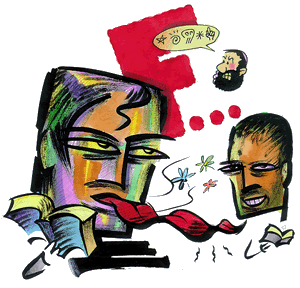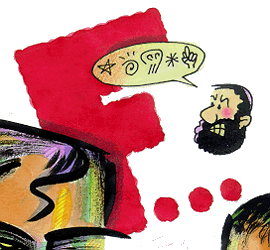Miscellanea / Manjula Padmanabhan
That verminous little tetragrammaton that rhymes with duck...
 There was a time when the f-word was erased from the soundtrack
of movies appearing on Indian screens. But if that policy had
been followed in the case of Martin Scorcese's Casino, it would
have been a silent film. For the two main characters, Nicky and
Acee, it was the essential crutch without which their conversation
wouldn't have staggered past the credit titles.
There was a time when the f-word was erased from the soundtrack
of movies appearing on Indian screens. But if that policy had
been followed in the case of Martin Scorcese's Casino, it would
have been a silent film. For the two main characters, Nicky and
Acee, it was the essential crutch without which their conversation
wouldn't have staggered past the credit titles.
What is the power of this squat, unlovely, single-syllabic utterance
that it deserves to become the soup, main course and dessert in
a cinematic banquet lasting some three hours? Why, when it thumps
dully through a conversation with all the charm of bullets shot
through a silencer is it such a hit with gangsters and schoolchildren
alike?
Of all writers, perhaps only D H Lawrence in Lady Chatterley's
Lover was able to pass it through the mouth of his famous gamekeeper
to produce a sound which was warm and natural. In any other context
it sounds like a death-threat dressed up as violent intercourse.
And according to Lewis Thomas in Life of a Cell, that is exactly
what it is. He writes that it is derived from Peig, a crawling,
wicked Indo-European word meaning evil and hostiles. He traces
it through gafaihaz in Germanic, meaning 'foe' to gefah
in Old English, thence to faege meaning 'fated to die.',
finally achieving fokken in Old Dutch.
 'The unspeakable malevolence
of the message,' he writes, 'is now buried deep inside
the word, and out on the surface it presents itself as merely
an obscenity.'
'The unspeakable malevolence
of the message,' he writes, 'is now buried deep inside
the word, and out on the surface it presents itself as merely
an obscenity.'
Whatever its etymology, the f-word offers too little in the way
of modern meaning to deserve its position as the premier curse
word, the world over. One of the nuns in my boarding school had
a refreshing solution to the desire to swear. According to her,
the need to vent strong feeling by employing profane words can
be diverted identifying words or names which had the same concussive
effect on the air-waves yet offended no one. The trick lay in uttering
the word with sufficient conviction and force. "Don't say
hell and damn girls," she counselled, "say instead, Oh
Vladivostok!" Similarly: Oh Kanchenjunga! Kamchatka! Pygmalion!
Those of us studying German soon discovered that we were at an
advantage. "You Schurrbart!" we could yell, "you
billig blau Haus!" and mean nothing more vile than
'moustache' and 'cheap blue house.' Of course, the acknowledged
master of the inoffensive curse is the legendary Captain Haddock
of Tin Tin comics. 'Billions of bilious blue blistering barnacles!'
is a favourite of his, alongside 'Bashi-bazouks, thundering typhoons,
cercopithecuses and iconoclasts.'
Dictionaries of scientific terms
are a wonderful source for authentic-sounding curses. Imagine
calling someone a 'squamose spirochaete', a 'carbuncular
poikilotherm' or an 'azygous narcoma'. Their meaning
are both nonsensical and harmless: 'spirally moving disease-producing
organism with scales'; 'cold-blooded being with bois';
and 'unpaired narcotic coma.'
 However, if one is diligent,
one can discover curse-worthy terms which have offensive meaning
too: 'microcephalic' meaning small-headed, 'putid'
meaning decayed and 'improcereant' meaning sexually
impotent. And surely no one but another germ would want to be
called a 'staphyllococcus' or a 'rhinovirus'.
However, if one is diligent,
one can discover curse-worthy terms which have offensive meaning
too: 'microcephalic' meaning small-headed, 'putid'
meaning decayed and 'improcereant' meaning sexually
impotent. And surely no one but another germ would want to be
called a 'staphyllococcus' or a 'rhinovirus'.
In his book Words, Paul Dickson presents a chapter of alternative,
refurbished and otherwise delightful choices of epithets available
to the pious blasphemer. 'Amplexus,' for instance, which
means 'the rutting of frogs and toads.' Or how about
'Uzzard,' meaning a third generation bastard? Or 'Sluthc'
which blends bitch and slut? He offers 'Bigsix' as a
collective term, packing into one word the meanings of the six
commonest words that American publishers and broadcasters need
to watch out for.
And he quotes a passage of supremely eloquent
cursing from a 1991 novel called Final the Woman, of which the
following is only a tiny fragment: 'See here, you slack-salted...
interdigial germarrium, you rantipole sacrosciatic rock-barnacle
you.' He quotes Stephen Leacock as having used 'Asterisk'
as an effective and elegant abuse: 'Asterisk' shouted
the pirate. 'I'll make it two asterisks,' snarled the other, 'and
throw in a dash', 'And then there are the everyday products
and brandnames which might easily be turned into G-rated curses.
He offers 'Kodak' and 'Kleenex' out of what
must surely be an infinite universe: Bata! Tabasco! Purolator!
Nescafe!
One of the most interesting curses I have heard recently is from
the audio-cassette called One Poem at a Time, read by American
poet Samuel Hazel: 'Cursed by the father of the bride of
the blacksmith who forged the iron for the axe with which the
woodsman hacked down the oak from which the bed was carved in
which was conceived the great-grandfather of the man who was driving
the carriage in which your mother met your father!' How much
more satisfying this is than that verminous little tetragrammaton
that rhymes with 'duck.'
Illustrations: Dominic Xavier
Manjula Padmanbhan, author, cartoonist and columnist, commences a column to Rediff On The NeT.
|





 There was a time when the f-word was erased from the soundtrack
of movies appearing on Indian screens. But if that policy had
been followed in the case of Martin Scorcese's Casino, it would
have been a silent film. For the two main characters, Nicky and
Acee, it was the essential crutch without which their conversation
wouldn't have staggered past the credit titles.
There was a time when the f-word was erased from the soundtrack
of movies appearing on Indian screens. But if that policy had
been followed in the case of Martin Scorcese's Casino, it would
have been a silent film. For the two main characters, Nicky and
Acee, it was the essential crutch without which their conversation
wouldn't have staggered past the credit titles.
 'The unspeakable malevolence
of the message,' he writes, 'is now buried deep inside
the word, and out on the surface it presents itself as merely
an obscenity.'
'The unspeakable malevolence
of the message,' he writes, 'is now buried deep inside
the word, and out on the surface it presents itself as merely
an obscenity.'
 However, if one is diligent,
one can discover curse-worthy terms which have offensive meaning
too: 'microcephalic' meaning small-headed, 'putid'
meaning decayed and 'improcereant' meaning sexually
impotent. And surely no one but another germ would want to be
called a 'staphyllococcus' or a 'rhinovirus'.
However, if one is diligent,
one can discover curse-worthy terms which have offensive meaning
too: 'microcephalic' meaning small-headed, 'putid'
meaning decayed and 'improcereant' meaning sexually
impotent. And surely no one but another germ would want to be
called a 'staphyllococcus' or a 'rhinovirus'.